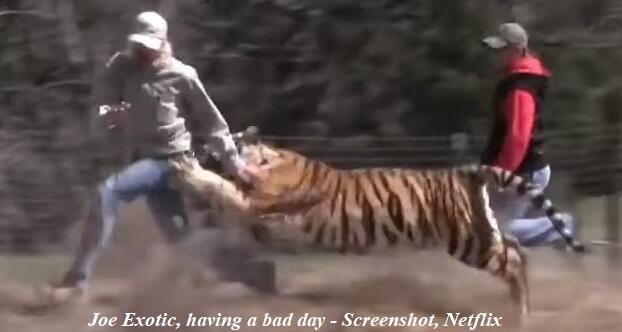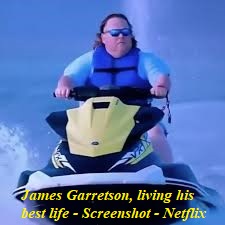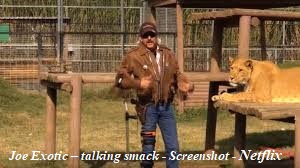Joe Exotic vs. Trademark law – root cause of where it all went wrong

Joe Exotic (aka Joe Schreibvogel, aka Joe Maldonado, aka that gun toting, mullet wearing, proudly flaming country singing, big-cat-keeper) was brought down ostensibly by Jeff Lowe and this guy, James Garretson, with his glorious hair and his jet ski, who turned snitch and exposed (or fabricated) a murder for hire plot against Carol Baskin, that along with a whole mess of exotic animal trafficking and animal cruelty charges put Joe away for 22 years.
 In doing any root-cause analysis of the downfall of Joe Exotic, you could analyze his choice to breed and sell baby lions, tigers, ligers, take meth, marry dudes who take meth, make videos of yourself blowing up effigies of Carol Baskin using assault weapons and Tannerite, but none of those things was the root cause of what brought Joe Exotic down. The series Tiger King is highly entertaining and has many valuable life lessons – and not just the obvious ones about not buying tigers and not doing meth. It has valuable lessons about intellectual property, fraudulent transfers, and founders losing control to investors.
In doing any root-cause analysis of the downfall of Joe Exotic, you could analyze his choice to breed and sell baby lions, tigers, ligers, take meth, marry dudes who take meth, make videos of yourself blowing up effigies of Carol Baskin using assault weapons and Tannerite, but none of those things was the root cause of what brought Joe Exotic down. The series Tiger King is highly entertaining and has many valuable life lessons – and not just the obvious ones about not buying tigers and not doing meth. It has valuable lessons about intellectual property, fraudulent transfers, and founders losing control to investors.
Intellectual property violations and unfair competition
What brought Joe Exotic down was his decision to use unfair trade practices and violate the intellectual property of Carol Baskin, the owner and operator of Big Cat Rescue. If you haven’t watched the show, the following is something of a spoiler, though it seems like most of the country has seen the show by now. (All the following factual information comes from me watching the show, not any independent research.) Carol Baskin owns and operates a big cat sanctuary called “Big Cat Rescue” in Florida. She and PETA were trying to shut down Joe Exotic’s G.W. Zoo in the middle of Oklahoma. Mr. Exotic got upset and set up a company called BCR Entertainment that had a website and logo for Big Cat Rescue Entertainment. He used a logo that basically copied the Big Cat Rescue logo, with the word “Entertainment” below it in light-colored font. He got a phone number in Florida, which routed to Oklahoma where he lived. He very obviously was trying to divert Carol Baskin’s customers and donors to himself. He very obviously was going to get sued.
 One might have thought that if Carol Baskin had not registered her trademark with the Patent and Trademark Office, or if he used something that was not exactly the same, he wouldn’t be in trouble. One would be wrong. Carol Baskin had used the Big Cat Rescue name and logo in commerce. The name, while somewhat descriptive, had become famous and distinctive. Baskin and Big Cat Rescue had millions of Facebook post views and YouTube views. She had a major nonprofit operation in Florida, loads of visitors to the park itself, and loads of people who saw her on the internet. Big Cat Rescue was unique and distinctive.
One might have thought that if Carol Baskin had not registered her trademark with the Patent and Trademark Office, or if he used something that was not exactly the same, he wouldn’t be in trouble. One would be wrong. Carol Baskin had used the Big Cat Rescue name and logo in commerce. The name, while somewhat descriptive, had become famous and distinctive. Baskin and Big Cat Rescue had millions of Facebook post views and YouTube views. She had a major nonprofit operation in Florida, loads of visitors to the park itself, and loads of people who saw her on the internet. Big Cat Rescue was unique and distinctive.
Joe Exotic took the unique name and changed it in a way that was meant to deceive. By using the same first three words, then adding on the word “entertainment” which did not change the main name or its meaning, and by copying the logo, while adding the word “entertainment”, his move was designed to confuse consumers and divert them.
There are common law rights to trademark. While it is always advisable to register your trademark with the US Patent and Trademark Office, the creator of a brand and logo has a common law right not to have that trademark infringed. Joe Exotic also committed common law unfair competition for the same actions. His actions also would have violated the Lanham Act, 15 USC § 1125(a) which says:
uses in commerce any word, term, name, symbol, or device, or any combination thereof, or any false designation of origin, false or misleading description of fact, or false or misleading representation of fact, which—
(A)
is likely to cause confusion, or to cause mistake, or to deceive as to the affiliation, connection, or association of such person with another person, or as to the origin, sponsorship, or approval of his or her goods, services, or commercial activities by another person… shall be liable in a civil action by any person who believes that he or she is or is likely to be damaged by such act.
Creating a name that is basically the same as your competitor as a way to poach their business is exactly what the law doesn’t allow. It is referred to as “passing off” yourself as another and is classic unfair competition. Joe Exotic seems to live by the credo of “go big or go home” so he went all in and also took the logo and put up a Florida phone number to make it even more likely that Big Cat Rescue’s customers/donors would be fooled. That’s why he got hit with a $953,000 judgment.
Laws are usually passed reactively not proactively. Laws get passed to stop shenanigans that have already occurred, to stop them from happening again. The Lanham Act deals with the reality that lots of people want to steal others’ business. Plenty of people aside from Joe Exotic still do this.
A few years ago, we represented a company called “Automodeals”, a company in Houston that operated throughout the state of Texas assisting folks with buying cars. They had a website: Getautomodeals.com. All of a sudden, the owner got calls from friends stating that there was another company called “AutomoDeals”, using the website automodeals.co that was also in the business of helping folks buy cars and was based in San Antonio, and happened to be run by a convicted sex offender. The second “AutomoDeals” applied for a trademark even though it came second and tried to get the Getautomodeals.com website shut down through GoDaddy.com. We sued and got them shut down for violations of the Lanham Act, common law trademark violation and unfair competition, almost exactly what took down Joe Exotic. Recently, we got a call from a nail salon whose competitor, operating down the street, set up a website with the first salon’s name in it, diverting traffic. This situation is more common than you’d think.
Fraudulent transfers
Joe Exotic had spent years insulting and threatening Carol Basking, shooting effigies of her, and threatening all kinds of vile things. But what brought him down was the $953,000 judgment. Once Carol had the judgment, she could execute on the judgment and start stripping assets from Joe Exotic. Joe reverted to form and again broke the law, in predictable ways. In order to shield assets, he transferred them to friends and family members, including his mother. Unfortunately for him, this violated the Uniform Fraudulent Transfers Act. If a person or company transfers assets for less than full value in order to try to shield them from a judgment creditor, then the new owner and the former owner get sued to undo the transfer to make it eligible for the judgment creditor to collect.
That’s why Joe Exotic’s mom got sued by Carol Baskin, because Joe put assets in his mom’s name. If he had sold the assets for full value and had the cash, then the cash could be used to satisfy the judgment. In this way, if he had prized possessions that he didn’t want Carol Baskin to own, he could sell them and give Carol the money and later recover the assets from the person he sold them to by buying them back. That is the sensible and responsible thing to do. Most people don’t do that. They try to give the assts to relatives or sell them for very little, to frustrate their litigation opponents. All it does is get the defendant’s relatives and friends sued.
Holy war litigation
At one point in the docu-series, someone on Joe’s side said they didn’t think Carol Baskin would come after Joe’s assets because it would cost more in lawyer fees than the assets she could collect would be worth. Joe Exotic had a fundamental misunderstanding of a legal holy war. A “holy war” is fought over ideology, not land gains. In a holy war, rational decisions about cost versus benefit of tactics and strategy don’t get made. In a holy war, the only goal is to destroy the opponent. Holy wars are expensive to fight and not economically rational at first blush. However, Lanham Act / unfair competition lawsuits often become holy wars. When a business competitor tries to steal a party’s identity, by stealing its name and logo and diverting customers, the aggrieved party usually feels threatened to the point that they want to bury the person who is trying to steal – literally steal – the business they worked hard to build. A party who would resort to stealing customers by stealing names and logos is one that has to be destroyed. So, the normal rules of litigation finance don’t hold, and the aggrieved party will launch a holy war litigation because they feel like their business’s very existence is at issue.
Joe Exotic failed to recognize that by stealing Carol Baskin’s name and logo and trying to divert her donors to him, he was starting a holy war. Once a holy war starts, it doesn’t stop until one side is shut down. That is why Carol Baskin was willing to spend more in legal fees than she could hope to recover. It was why she was willing to file lawsuits against anyone receiving an asset from Joe Exotic, to isolate him.
What Carol Baskin did is perfectly rational. She had spend what it took to shut down Joe Exotic’s thievery as a lesson not to steal her intellectual property, which was the heart of her business. It’s what happened in the “Automodeals” case, where we went after the thieving company hammer-and-tong and did not stop until the sex offender competitor was shut down, and his partners left him.
If ever there is a time where you, as a business owner, thinks that something might be too close to a competitor and might be perceived as being sneaky to the point of being unfair, then stop. Courts have seen it before and don’t like it. It provokes a response far out of proportion to otherwise rational commercial decisions. It is a rational decision from the business defending its intellectual property – the essence of its business. It’s like poking a tiger in the eye.
When that happened, Joe had to turn to an outsider, in his case, Jeff Lowe.
Founders losing control to investors
A constant worry among founders of small businesses is losing control to an investor. Many times, the founders, when they set up the company, will build in multiple classes of shares (or membership interests if it is an LLC). Typically, the founders retain the Class A shares, which have preferential voting rights. The Class B shares get a portion of profits commensurate with their percentage of ownership but have less voting rights. Frequently, the investors will only agree to such an arrangement as long as the business is doing well, so will require a clause that if financial goals (specified) are not met, then the owners of Class B shares get more board seats, so they can effectively take over management of the company.
However, when a business gets desperate, as Joe Exotic did, they have to take investors without the ability to stagger classes of shares. Jeff Lowe, who arrives later in the show, apparently brought in money and bought Joe Exotic’s zoo. Then Lowe took over and Joe Exotic was upset. The problem was that he had a huge debt to Carol Baskin and had to bring in outside money, which led to losing control and losing his zoo. Depending on your view of private zoos, Joe Exotic, and/or Carol Baskin, and Jeff Lowe, you may or may not think that is a bad thing.
Conclusion
The rest of the story, with Jeff Lowe giving evidence that helped convict Joe Exotic of a murder for hire plot to have one of Lowe’s employees murder Carol Baskin, followed the loss of the lawsuit, the loss of control and Joe Exotic’s general desperation.
You might think it all went wrong with the tigers and meth and gay polygamy. From a legal standpoint, it all went wrong when Joe Exotic tried to steal Carol Baskin’s customers/donors with a deceptively similar name and logo, diverting the customers illegally, then fraudulently transferring assets, then having to take on an investor in desperation.
From a business owner’s perspective who is aligned with Carol Baskin, it makes sense to regularly check your business name and website to make sure there isn’t someone out there trying to steal it. It’s worth it to Google-search your business name, splitting it up so it has to run through a search engine (like me typing “law done right” to see what comes up), and being willing and able - financially - to defend your business from competitors acting illegally. When a legal holy war starts, your business has to fight.